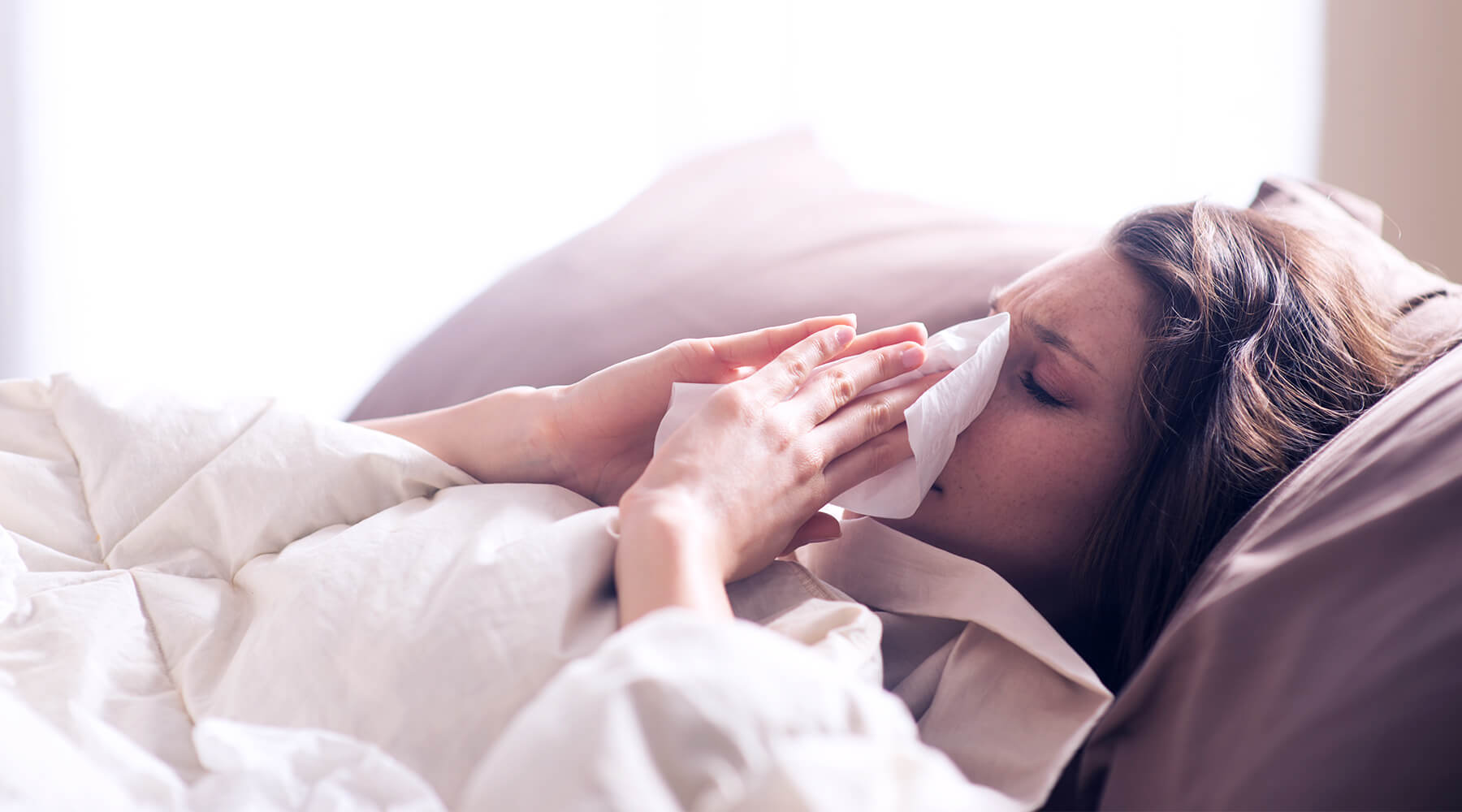
Sleep with a cold
Sleep is the best medicine - but sleeping well when you have a fever, a cold or a strong cough is not that easy. Find out here how you can sleep well despite an acute cold and support your immune system in the fight against pathogens.
Table of contents
- Cold & Sleep
- How cold symptoms disrupt sleep
- Tips for a good night's sleep despite a cold
- Optimal sleeping conditions
- The right sleeping position
- rest & relaxation
- Preparation & Attunement to Sleep
- exercise, fresh air & daylight
- Tips for the immune system during sleep
- Conclusion
1. Cold & Sleep
Especially in the cold, wet winter months, bacteria, viruses and other pathogens have an easy time and we suffer more from colds or flu infections. So it's time for a strong immune system to ensure that you remain healthy and productive even in the dark winter. To develop a strong immune system, it is important to get enough sleep and sleep well. Especially in the deep sleep phases that occur more frequently at the beginning of our sleep, the natural number of defense cells in the body increases and the immune system works at full speed to neutralize invading pathogens. lack of sleep on the other hand, is bad for your health. The saying “sleep is the best medicine” is not without reason!

Of course, we can't always prevent ourselves from catching a cold or flu. When we suffer from classic cold symptoms such as a runny nose, cough, sore throat or fever, we often can't even think about getting the sleep we desperately need. Blocked airways, coughing or pain stimuli make breathing difficult and cause stress for the body and brain. This makes falling asleep a challenge or we keep waking up during the night - even though sleep is urgently needed to strengthen the immune system and ensure a quick recovery. So what can we do to sleep well despite annoying cold symptoms?
2. How cold symptoms disrupt sleep
The most common complaints include impairments of breathing and the respiratory tract, for example due to a runny nose, cough and sore throat, irritation of the mucous membranes or mucus formation in the respiratory tract. In winter in particular, the dry heating air damages the mucous membranes of the nose, mouth and throat and inhibits their natural defense mechanisms, so that bacteria and viruses can multiply more easily. It also dries out already irritated tissue or increases mucus formation, which in turn blocks the respiratory tract and makes breathing difficult during sleep. This can make it difficult to fall asleep. snoring and a peaceful night's sleep can be prevented by breathing pauses or a dry cough.
But an increased body temperature, headaches or aching limbs, as well as psychological stress due to exhaustion or fatigue can also get in the way of restful sleep when you have a cold. Fever or chills irritate the nervous system, aching limbs prevent you from sleeping in a relaxed position, and the famous carousel of thoughts disrupts the process of falling asleep.
3. Tips for a good night's sleep despite a cold
#1 Suitable sleeping conditions (room climate)
A cool room temperature between 16 and 18 degrees Celsius and a humidity of 40% - 60% are considered the optimal sleeping environment.Try to ventilate thoroughly before going to bed or increase the humidity by using humidifiers, water bowls or diffusers. Certain fragrances or essential aromas, such as chamomile, eucalyptus or lavender, can also have a calming effect on the mucous membranes and lead to a pleasant sleeping environment that supports sleep.

#2 The right sleeping position
Especially if you have a bad cold or a dry cough, you should try to position your head a little higher at night and sleep on your back. This reduces the pressure on the chest and sinuses and allows nasal mucus to drain, thus avoiding pressure-related headaches and making breathing easier while you sleep.
#3 Rest & Relaxation
Our body needs a lot of energy to fight the pathogens inside – this leads to stress not only mentally but also physically and prevents restful sleep. rest and relaxation are therefore more important than ever to calm the constantly active and overstimulated nervous system and to enable restful sleep. Therefore, avoid particularly strenuous, demanding activities and strong distractions and also avoid strong visual stimuli such as television or computer games before going to sleep.
#4 Getting ready for sleep

Prepare yourself for sleep not only mentally but also physically. A warm shower or a hot bath before going to bed not only has a relaxing effect, but also signals to the body that it is preparing for sleep by lowering the body temperature. The warm, moist steam that rises also has a positive effect on the respiratory tract by stimulating blood circulation and moistening the sensitive mucous membranes. You should also make sure to drink enough fluids during the day. But be careful: reduce the amount you drink slowly before going to bed so that you don't wake up at night with a strong urge to urinate and your sleep is further disturbed.
#5 Exercise, fresh air & daylight
Lots of peace and lots of sleep However, this does not mean that you have to stay in bed. Exercise, sufficient daylight and fresh air help to stimulate circulation and metabolism and to supply the respiratory tract with fresh air. It is also important to consume enough daylight to maintain a healthy sleep-wake rhythm and not only make it easier to fall asleep in the evening, but also improve the quality of sleep overall. A walk in the fresh air can also work wonders mentally and make a decisive contribution to getting a good night's sleep and quickly beating the cold.
4. Tips for the immune system during sleep
Colds, corona or other nasty infections can quickly cause sleep problems, although rest and recovery are exactly what our body urgently needs at that time. For a good night's sleep, you should of course make sure you have a good sleep hygiene and, at best, our Sleep Tips for a Strong Immune System For example, our diet plays a key role in healthy sleep and a strong immune system. A balanced diet and certain nutrients, especially vitamins and amino acids, can provide additional support for your body and sleep, especially during an acute cold or flu. You can find out more about this in the following articles in our sleep magazine.
To the article Vitamins for a good sleep
To the article Amino Acids & Sleep
5. Conclusion
-
Cold symptoms such as a runny nose, cough or fever disrupt sleep, reduce sleep quality and prevent the development of a strong immune system.
-
An appropriate room climate (16-18 degrees Celsius, 40%-60% humidity), sufficient relaxation, an adapted sleeping position with the head elevated or a hot shower alleviate sleep-disturbing symptoms and help to ensure a peaceful, restful sleep.
-
Exercise, daylight, fresh air and a vitamin-rich diet make sleep easier and support the body in the fight against pathogens.
Best regards and see you soon!



Leave a comment
This site is protected by hCaptcha and the hCaptcha Privacy Policy and Terms of Service apply.